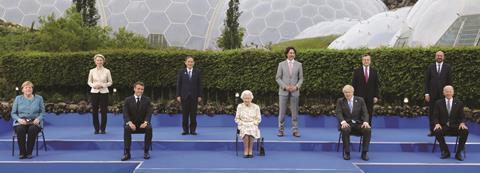The first meeting of world leaders in over a year was a disappointment, say charities

As seven of the world’s most powerful leaders descended on the Cornish town of Carbis Bay to discuss some of the biggest issues facing our planet today, there was a groundswell of anticipation. Would fresh action to combat climate change be announced? Would the world receive clear plans regarding vaccine sharing? Would world leaders finally make good on old promises to deliver financial support to some of the world’s poorest nations?
G7 nations represent 58 per cent of net global wealth, two-thirds of the world’s pharmaceutical market and a quarter of the world’s CO2 emissions. While some have questioned the legitimacy of this self-selected group, others have pointed to the power that they hold and the wealth that they represent. If it’s true that global problems require a global response, the G7 leaders certainly have the resources needed to make a real difference.
As leaders met behind a ‘ring of steel’ (hundreds of troops and thousands of police officers were deployed in one of the most expensive security operations the UK has ever seen), the Church in Cornwall joined with activists, advocacy teams and campaigners to add their voice – and prayers – to those calling for action. Christian young people wrote an open letter to the G7 leaders as part of Tearfund’s Take a Stand campaign while the Catholic Agency for Overseas Development (CAFOD) held an inter-faith service at Truro Cathedral and lobbied for G7 leaders to write off Third World debt. MPs and church leaders met together to pray and Christian charities joined those of other faiths and none as part of the Crack the Crises coalition, 75 organisations working together to advocate for a better future for people and planet.
BROKEN FAITH
For many Christian campaigners, the outcome of the long-awaited talks were frustratingly low on specifics. Ruth Valerio, head of global advocacy and influencing at Tearfund, said the leaders had “broken faith with communities battling the crises of Covid-19 and climate” while Patrick Watt, director of policy and campaigns at Christian Aid, said “the G7 leadership has failed to make real progress”.
On the 2015 Paris Agreement to limit global warming to 1.5C, little detail was added to previously stated promises. Campaigners believe this was a missed opportunity to assess the progress made – or changes needed. Boris Johnson did speak of driving a global green industrial revolution and helping low and middle-income countries build infrastructure such as wind farms and railways as part of a green recovery, but there were few details given on timescales or costs. And Valerio was dismayed by the Prime Minister’s method of transport. Replying to a tweet from Johnson she wrote: “You flew??? From London to Cornwall???? To talk about building back better, fairer and greener???? Words. Fail. Me.”
SIGNS OF PROGRESS
There were some causes for celebration. Recognising the impact of coal on the climate, G7 leaders committed to end financial support for coal power overseas by the end of this year and transition away from coal at home too. However, G7 nations have actually committed more money to fossil fuel-intensive sectors than clean energy since the start of the pandemic, according to Tearfund.
On Covid-19 recovery, the news was also mixed. Most Revd and Rt Hon Justin Welby, Archbishop of Canterbury, welcomed the donation of 1 billion vaccines as an “important step towards vaccine equity” but acknowledged that there was “much more to do” if G7 leaders are to meet their target of eradicating Covid-19 by 2022. As Christian Aid held a vigil to remember the 3.7m people worldwide who have already died during the pandemic, campaigners pointed out that wealthy countries have now ordered enough vaccines to immunise their populations three times over, while 69 poorer countries have enough for only one in ten of their citizens. Without “recipes, rights and technology”, argues Valerio, it will take 57 years to vaccinate the world.
CHRISTIAN ACTION
On the last Sunday of the summit, Joe Biden attended a Catholic church service in St Ives while Johnson deflected questions from journalists on his own faith.
Speaking to Premier Christianity, Rt Rev Philip Mounstephen, Bishop of Truro, said Christians should “remember that the government sits on the shoulders of our saviour and not on the shoulders of the G7”.
World leaders will return to the UK in November for the 26th United Nations Climate Change conference (COP26), in Glasgow. When they get there, walkers and cyclists from the Young Christian Climate Network will be there to meet them. Commissioned at a special Young Pilgrims service at Truro Cathedral as the summit drew to a close, they’ll complete nearly 1,000 miles in relay, ensuring Christian voices and prayers do not die down now that G7 is over.
Campaigners will certainly be praying for more concrete action from COP26. “There is still time for rich nations to deliver a solidarity package that tackles these interconnected crises,” said Watt. “Without it, the COP will fail.”






































